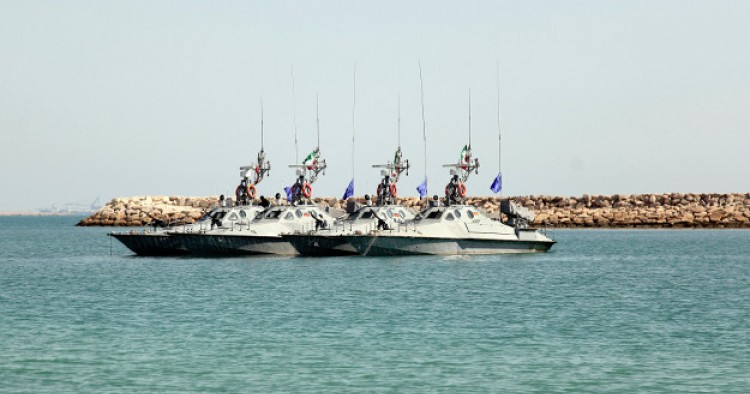The chief commander of the Islamic Revolution Guards Corps (I.R.G.C.) Navy warned on Thursday that Iran’s enemies, particularly the United States, would suffer heavy losses in the Persian Gulf if they showed any aggression against the Islamic Republic. “We have not spared even 24 hours to upgrade I.R.G.C.’s naval capabilities against enemies, particularly America,” Rear Admiral Ali Fadavi said, adding that the I.R.G.C. Navy has considered the United States its primary enemy since the 1980s and has prepared to confront it. Fadavi further claimed that 97 I.R.G.C. vessels patrol Iran’s territorial waters in the Persian Gulf and the strategic Strait of Hormuz in addition to a large number of military vessels of Iran’s regular army in the Sea of Oman. The top I.R.G.C. commander complained that a number of ships owned by the National Iranian Tanker Company (N.I.T.C.) and the Islamic Republic of Iran Shipping Lines (I.R.I.S.L.) fly other countries’ flags, and urged them to instead carry Iranian flag, which he said would guarantee their security and safety. I.R.G.C. media outlets reporting on Fadavi’s comments also quoted him and other Iranian military and political leaders as saying that Tehran opposes the presence of the U.S. military in the Persian Gulf region.
Comment: Fadavi’s remarks come at a time when U.S. military officials increasingly complain about the I.R.G.C. Navy’s harassment of American naval assets in the Persian Gulf. American officials warn that the I.R.G.C. Navy’s repeated provocations could lead to miscalculations and dangerous confrontations in the Persian Gulf. As tension between Washington and Tehran over the latter’s ballistic missile program and support for terrorism is escalating, Iranian officials are also increasingly calling on – and at times threatening – the U.S. military to leave the Middle East region.
On May 10, for example, Major General Mohammad Hossein Bagheri, the chief of staff of the Iranian Armed Forces, hinted that the country’s naval forces would use speedboats manned by “martyrdom-seeking combatants” against the U.S. Navy in case of a naval warfare in the Persian Gulf. “These boats are not just a piece of equipment; they are a culture,” Bagheri said at a conference on speedboats in Tehran. “The combatant that mans it is inspired by faith and trust in God and the martyrdom-seeking spirit of Ashoura [a major religious commemoration of the martyrdom of Prophet Muhammad’s grandson at Karbala]. He shuts his eyes to worldly attractions and steps into jihad [holy war] against the infidel front. He is ready to sacrifice his life,” he added.
Last month, Yadollah Javani, advisor to Supreme Leader Ali Khamenei’s representative at the I.R.G.C., said the era of American “hegemony” was over and called on the U.S. military forces to leave the Middle East region. Similarly in March, Iran's Defense Minister Hossein Dehghan depicted the U.S. naval forces in the Persian Gulf as armed intruders and called on Washington to leave the region. “What are the Americans doing in the Persian Gulf? It is better they leave this region and do not create trouble for the regional countries,” he said in a reaction to statements by U.S. military officials about Iran’s destabilizing role in neighboring Arab countries and harassment of the naval forces of the United States and its allies in the Gulf region. “Is it acceptable that an armed, insane thief breaks into someone’s house and expects the red carpet to be rolled out for him? This is one modern example of the 21st century barbarism,” he added.
And in late April, Iran’s Foreign Minister Javad Zarif defended the I.R.G.C.’s provocative actions in the Persian Gulf. "Breaking: Our Navy operates in — yes, correct — the Persian Gulf, not the Gulf of Mexico. Question is what US Navy doing 7,500 miles from home," he tweeted, after American officials said a U.S. Navy guided-missile destroyer had fired a warning flare to deter an I.R.G.C. vessel approaching it in the Persian Gulf.
The Middle East Institute (MEI) is an independent, non-partisan, non-for-profit, educational organization. It does not engage in advocacy and its scholars’ opinions are their own. MEI welcomes financial donations, but retains sole editorial control over its work and its publications reflect only the authors’ views. For a listing of MEI donors, please click here.













